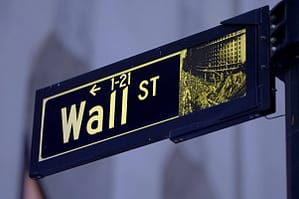Remember the trader who told the BBC that “Goldman Sachs rules the world”? This is his column
Our columnist Alessio Rastani is the self-proclaimed trader who shocked the world by declaring live on BBC News that he goes to bed “every night dreaming of the next recession” and that “Goldman Sachs, not the governments, rule the world”. He’s a controversial figure, not least because he’s a self-taught non-institutional trader with no FSA license. But he certainly isn’t shy about sharing his views. Do you agree with his words? (His words are his own, and in no way endorsed by LondonlovesBusiness.com)
It was 11am on a September day when my phone rang. I knew exactly who it was and what it was for.
A Forbes journalist wanted to interview me about a media storm that was gripping the world.
The financial markets were in turmoil and the world was on the brink of another global recession.
But that wasn’t the headline on most newspapers and TV Channels.
Instead, the media was abuzz with articles of a financial trader publicly announcing on the BBC that he was “dreaming of another recession”. Apparently he was dreaming about one for three years!
I finally answered my phone.
A lady with a friendly American accent spoke: “Would you like to comment on what you just said on the BBC? What did you mean Alessio Rastani: Why the euro is going to be trashed
I stood silent for a while, thinking, “should I really explain this?”
It seemed that Forbes had already made up its mind about me. The day before they ran an article titled “Stock Traders Are Psychopaths”
So are all traders greedy “psychopaths” driven by the need to make a killing in the market?
There are so many things wrong with this question.
First, I think the media fails to make a distinction between two types of traders, and why each type approaches trading in the first place.
By the two types of traders I mean institutional traders and non-institutional, or “retail”, traders.
Does this distinction really matter? Aren’t all traders driven by the need to make money?
Yes, perhaps.
It would be grossly hypocritical to say that “making money” somehow was not a part of the equation. Even worse would be to pretend that traders are somehow “saints” out to make the world a better place (oh please!).
However, the psychological pressures that drive the different types of traders to trading are, in my view, completely different.
In fact, when I posed the question “What drives you to trade?” on my Facebook page, the answer I got from retail traders was not “I want to make money!”
The most common answer was “freedom”. The freedom to do what they want, when they want, without a boss looking over their shoulder and capping their salary.
For these “independent” type traders the goal of being self-sufficient with an income that does not rely on a 9-5 job seems to be a great motivation.
This is hardly psychopath mentality.
However, when it comes to institutional traders, I believe the psychological driving force that makes them trade is rather different.
For one thing, institutional traders are not trading their own money. They are trading other people’s money.
Retail traders, on the other hand, very likely come to the market trading their own hard-earned cash.
For me, the biggest problem with the financial industry is the fact that there are little incentives whatsoever to prevent institutional traders from taking extreme risks with people’s money.
Take the example of an airplane pilot. He has a responsibility to fly the airplane as safely as possible so that the passengers arrive unhurt. If he fails in this duty, both his life and the lives of the passengers on his plane are at risk.
The same can be said for the construction engineer: it’s his duty to make sure the building does not fall upon its occupants. Otherwise he’s not doing a good job.
When you compare this to the financial industry, what safeguards are there to ensure traders feel the same responsibility to the people whose money they are trading?
Is greed for bonuses so overwhelming that it surpasses any thoughts for fiscal responsibility?
The JP Morgan debacle where $9bn were lost seems to indicate that the lessons of 2008 have not been learnt. Financial institutions are making the same mistakes they made four years ago.
It has been argued that the very fact that banks knew the taxpayer would foot the bill for any losses incurred created an environment that made it easy for them to take bigger risks with people’s money.
It is very easy to blame banks and traders and label them as psychopaths.
But the public is perhaps also to blame for this “psychopathic” culture.
I once met a woman who told me how disappointed she was that her broker didn’t make her any money in the last 10 years. Yet when I asked her how much he had lost her she was puzzled. She admitted that her broker hadn’t lost her any money.
The culture and mentality of “greater rewards” and higher returns – the greed factor – is present not only in traders but in every one of us.
In a culture where traders have to deliver results for the firms they work for, and to satisfy their “profit hungry” clients, in other words, us, is it any wonder financial disasters happen and that disincentives are abandoned?
It is a fabric of our society that regards good results when a trader makes a profit yet he gets no credit for limiting loss.
Results are rewarded. Limiting loss is looked over.
If traders are psychopaths, then we are all to blame for creating this monster.
For further information about trading the markets visit my website www.LeadingTrader.com.
Alessio Rastani gained fame and caused controversy last year by stating live on BBC news that he “dreams of another recession” and that “Goldman Sachs, not governments, rule the world”. The YouTube clip has since been watched over two million times, and Alessio has subsequently been interviewed by figures such as Sir David Frost. His website is LeadingTrader.com.
More like this:
Alessio Rastani: Why impossible investments are usually the best
Facebook IPO: opportunity or “muppet bait”?
James Max: In defence of Goldman Sachs
He’s the City trader who blew £125k on one bottle of champagne. But who is 23-year-old Alex Hope?
The 27 reasons to fear economic apocalypse
Try our free newsletter






Leave a Comment